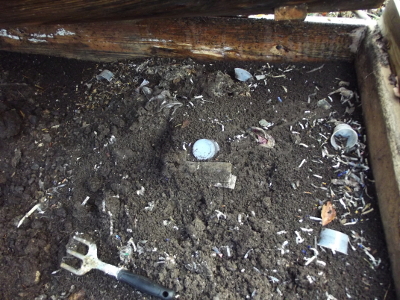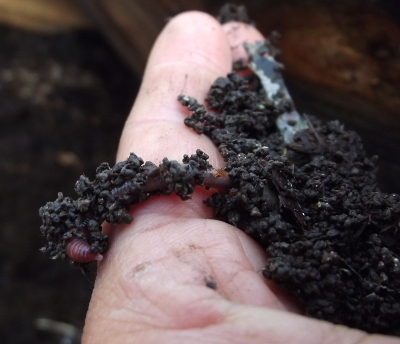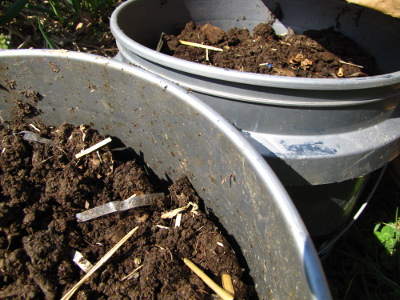
Harvesting worm castings
 Regular
readers may recall our ill-fated
school worm bin project from last year. When
we decided that collecting food scraps from our local middle school
wasn't worth the effort, I let the worm bin contents mellow for a while
and then added some
raw horse manure and bedding. Next, I proceeded to
ignore the bin for another seven months.
Regular
readers may recall our ill-fated
school worm bin project from last year. When
we decided that collecting food scraps from our local middle school
wasn't worth the effort, I let the worm bin contents mellow for a while
and then added some
raw horse manure and bedding. Next, I proceeded to
ignore the bin for another seven months.
The extended neglect
wasn't as awful as it sounds since worms in an above-ground bin are
mostly dormant during the winter. Last week, I poked around
inside and was thrilled to see that the year-old contents --- food
scraps, wood chips, shredded newspaper, and torn  cardboard --- had been
completely digested into high quality worm
castings. Yes,
there was some junk in there, mostly shredded envelope windows and bits
of non-biodegradable trash that the kids threw in with the food
scraps. But the quality of the castings themselves was higher
than any I've ever seen.
cardboard --- had been
completely digested into high quality worm
castings. Yes,
there was some junk in there, mostly shredded envelope windows and bits
of non-biodegradable trash that the kids threw in with the food
scraps. But the quality of the castings themselves was higher
than any I've ever seen.
That said, there wasn't
much of it. Not counting the horse manure (which I left in the
bin to keep the worms active until I add more manure), we ended up with
9 buckets of worm castings from 7
initial buckets of worms and castings, plus around 500 pounds of
food scraps and about as much bedding. That means our entire
school worm bin project boiled down to 10 gallons of castings!
(It's possible that the initial 35 gallons of worms and castings shrunk
a bit too since the biomass wasn't 100% digested when we bought it, so
it might be more
fair to say we got 20 gallons of castings from the project.)
 Although I'm amazed at how
much the compostables shrunk, I'm excited to put the compost to work in
the garden. We were lucky enough to be able to drive all 9
buckets in and I plan to put them to work immediately to feed the
carrots, cabbage, and parsley I'll be planting next week. I'm hopeful that, like
biochar, worm castings will increase
the long term health of the garden soil.
Although I'm amazed at how
much the compostables shrunk, I'm excited to put the compost to work in
the garden. We were lucky enough to be able to drive all 9
buckets in and I plan to put them to work immediately to feed the
carrots, cabbage, and parsley I'll be planting next week. I'm hopeful that, like
biochar, worm castings will increase
the long term health of the garden soil.
Want more in-depth information? Browse through our books.
Or explore more posts by date or by subject.
About us: Anna Hess and Mark Hamilton spent over a decade living self-sufficiently in the mountains of Virginia before moving north to start over from scratch in the foothills of Ohio. They've experimented with permaculture, no-till gardening, trailersteading, home-based microbusinesses and much more, writing about their adventures in both blogs and books.
Want to be notified when new comments are posted on this page? Click on the RSS button after you add a comment to subscribe to the comment feed, or simply check the box beside "email replies to me" while writing your comment.

hello there, great post on the worm project! Sounds a lot like mine here. A friend gave me one of those stackable worm farms and i have just loved it. It doesn't have the room to process as much as you did but I'm not complaining. Last year I sort of "seeded" worms into some of the raised beds the neighbor and I built and was pleased to see them lively with worms this spring! keep up the great work with your blog too. I love reading it and link to your posts frequently on my breaking news blog.
thanks for all your hard work, pamela
Jessie --- As you can tell by my extreme neglect of our bin and the results, worm bins are pretty hard to mess up. A small indoors bin should give you some great castings!
Pamela --- I'm so glad your worm farm is working well! A note on seeding the worms into your garden, though --- the worms you see later in the beds are very unlikely to be related to the ones you seeded. Compost worms live in colonies in manure piles (and similar situations) but won't survive long in garden soil. However, just adding high quality humus to your soil will help the worms that do live there thrive, so I'm sure it's all related!
Thanks for putting this up, just what I was looking for. New to this, but ready to start off. My wife, kids and I are getting ready to get into the farming life. Just got 8 ac of a small horse farm from her family, part of a 22 ac track. I have an interest in castings and the such, could you give me a little more info on how much horse manure to start off with per amount of worms. Totally green on this, so any info I can get is great.
Thanks in advance, Scott
Scott --- You're in luck! Especially if you bed the horses in straw, horse manure is the perfect food for compost worms.
For food scraps, the recommendation is to plan to feed the worms half a pound per day per pound of worms. (So, if you have five pounds of food scraps to use up each day, you'll need 10 pounds of worms.)
However, you can start with whatever worms you can come up with when using horse manure since the manure will just mellow, not attract flies and other problem insects the way food scraps will. Your worms will eventually reproduce enough to eat up whatever amount of manure you give them. If you start with more worms, you'll just see results faster.
I started vermicomposting last year as well, but have kept them in plastic bins in the garage the whole time. Starting with 1 pound (about 1000 red wiggler worms), I probably have about 7 pounds now even though they were not very active during the winter. One of the challenges is once they have consumed the bedding and food scraps and turned them into worm castings, it can be time consuming to pick out the worms and put them into a new bin so that the castings can be used in the garden.
Many commercial companies are using "flow through bins" where they keep adding bedding and food at the top while there is enough castings that can be harvested from the bottom. I haven't decided if I want to go through the trouble of building one of these types of bins or just deal with picking out the worms. (A Youtube search on harvesting worm castings will give you some ideas for improving that process)
Anna - were you able to retain many of your worms, or did they end up in the garden? (There are other ideas out there about vermicomposting trenches that allow you to compost right in the garden... but obviously requiring a lot more worms that just your small bin with food scraps)
David --- Good question! I used an extremely simple method that is only moderately effective. I shoveled the mostly digested food scraps to one end of the bin in the fall, then added fresh manure on the other side. Worms naturally migrated into the fresher manure and away from the more composted material. (Basically, it's a lot like the flow through bins, but with less infrastructure.)
That said, there were still a lot of worms in the castings I harvested --- I just tossed them on the garden for extra nitrogen. If I had my act together, I'd find a way to get chickens to eat the worms before applying the castings, which is what Harvey Ussery does. I figure that as long as enough worms made it into the fresh manure to get to work, though, it's okay to waste others.